| |
"If you go through with this, you'll be punished for it. You'll be accused of
betraying your country, you'll be branded as a liar as well." |
| |
"But I won't tell lies Mr. Tucker." |
| |
"You may not, but everybody else will. They'll get you.
The establishment. They'll get you." |
| |
Callan (with the alias Tucker) outlines how the world
works to Lady Janet Lewis in Suddenly – At Home |
Callan in colour. After watching the whole of series 2 and the surviving episodes from series 1 in 425-line monochrome, this took a bit of getting used to. For a while it actually felt wrong, as if I was watching black-and-white material that had been painstakingly colourised. It's not just that I first saw the series on a TV that hadn't yet learned how to process colour, or that I'd just watched twelve greyscale episodes in a row, but also that Callan is probably the nearest UK television has come to a genuinely noir drama. To add colour somehow felt wrong, a betrayal of the series' dark ethos. Maybe I just prefer that monochrome look.
But you quickly get used to it. This is Callan, after all. At least by the end of the first episode it is. Series 3 catches up with our boy five months after the dramatic conclusion of the previous season, and if you haven't seen those earlier episodes and intend to do so, then I'd proceed with caution as there are inevitably going to be some spoilers, though I'll try to keep them to a minimum. Newcomers would to well to familiarise themselves with the characters and story set-up, which I outlined in my review of Callan: The Monochrome Years and see no point in repeating here.
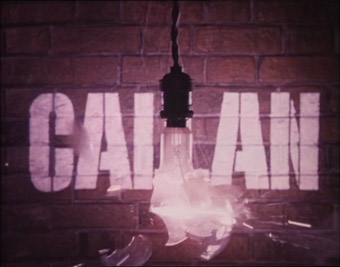
The switch to colour is not the only change in series 3. Obviously there's a new Hunter, but the biggest upset to the status quo is the departure of Toby Meres, so wonderfully played in the first two series by Anthony Valentine. The good news is that his departure is not permanent and that his replacement, James Cross (nicely played by a young Patrick Mower, now a regular on Emmerdale, of all things), is cocksure enough to provide Callan with a new professional nemesis. Fans of the previous episodes will be pleased to know that Lonely is back and that he's still played by Russell Hunter, who continues to wear the role like a tailored wet-suit. More than ever you get the impression that Lonely is the closest Callan will ever get to a real friend – he may still intimidate and be infuriated by him, but when things are at their blackest he's the first person he turns to. For some strange reason, Lonely seems a little less seedy in colour, but that may again be down to my monochrome bias.
There are even more recognisable faces in the supporting cast than in series 1 and 2, some of whom – Windsor Davies, Peters Sallis, Graham Crowden and Stephanie Beecham amongst them – would go on to front series of their own. The acting is consistently excellent throughout, from the lead players to often impeccably cast supporting roles. As ever, Woodward is commanding in every scene – you really could watch all six discs for his performance alone – but he's matched at every step by William Squire as the splendidly dour-faced and officious new Hunter and, when he reappears in series 4, Anthony Valentine as Toby Meres, whom the writers appear to have had a ball penning dialogue for.
It's the consistently high standard of acting and writing that makes Callan such standout drama, both of its time and almost forty years on from its first screening. Real care has gone into every line of dialogue and its delivery, and the only reason I abandoned my original idea of placing a choice quote from each episode at the top of its summary is that there are simply too many to choose from. I'd also like to throw in a shout for the direction, for its focus on character, its use of tightly framed close-ups and, with the exception of some attention-grabbing framing and use of reflections by Piers Haggard on Suddenly – At Home, its stealthy invisibility.
Watching both series over the course of three weeks, I've been left with a sense of loss for the television we once had. Nowhere now will you find a show as thematically dark, as creatively written, and as consistently well performed as you'll find in Callan. The three-part conclusion to season 4 brought the series to a end, and painful though it is to contemplate, it also ensured that it never went on to suffer the sort standard drop that has blighted so many more long-running shows. Such consistence of quality has ensured that Callan remains a jewel in the British television crown, a showcase for British writing and acting talent from a time before formula and generic convention were the TV watchwords.
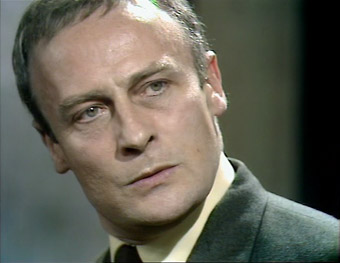
According to the sources I've been able to check, some of the episodes in series 3 are not in original broadcast order, though this could be an attempt to correct an earlier error – although first screened as the series' penultimate episode, Breakout is clearly intended as the season closer.
1: Where Else Would I Go?
At the end of his five month stay in hospital after being brainwashed and shot during a programmed assassination attempt, Callan is a partially repaired shell of his former self. He wants to return to work, but the diagnosis of Section doctor Snell (Clifford Rose, displaying the same sort of creepy officiousness he brought to his portrayal of Kessler in Secret Army) confirms the new Hunter's fears, that Callan no longer has the defiant aggression and killer instinct that previously made him their finest operative. Hunter needs a man with Callan's former skills, and faced with the choice of letting him go or engineering a return to his former self, he opts for the latter. Callan, meanwhile, goes looking for Lonely, only to discover that he's been banged up for larceny and is resentful that Callan was not there when he needed him. Determined to help him regardless of his objections, Callan calls on the services of top lawyer Henshaw, a former army captain whose life he once saved.
As if the shift to colour wasn't startling enough, we also have to deal with a the departure of Toby Meres, a cocky newcomer in the shape of James Cross, and a still traumatised Callan who's lost the aggression and bitter cynicism that made him one of TV's most compelling characters. But stick with it, as when the old Callan returns he does so with a vengeance, suddenly rounding on an over-confident Lonely and marching into Hunter's office with the angry defiance his new boss has been deliberately provoking him to rediscover. The switch-around is nicely signposted when Callan coldly threatens to scald Lonely's aunt after she calls on the help of muscle-bound butcher Wellington, who is played by none other than Dave Prowse, Mr. Alexander's personal bodyguard from A Clockwork Orange and the under-costume body of a certain Darth Vader.
2. Summoned to Appear
Callan and Cross are following Soviet agent Palanka (Sylvester Morand), who leads them onto a railway station platform and escapes after pushing a passenger under an approaching train. Callan is detained by the police as a witness and encouraged by Hunter to cover their operation by suggesting it was suicide, which conflicts with the claims of another bystander, Mrs. Kent (Rhoda Lewis), who is convinced he was pushed and that Cross was the one who did it. With Callan summoned to appear before the coroner's court and under investigation by the dogged Inspector Kyle (Norman Henry), the Section turn to Russian dissident Karas (the almost too-perfectly named George Pravda), a man Palanka mistakenly believes he once killed, to flush the spy out.
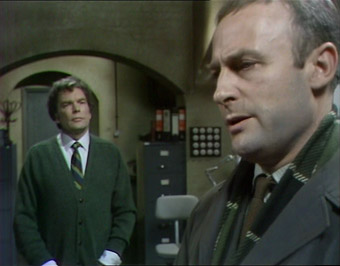
Callan's low opinion of Cross and his fear of returning to jail are both firmly established here, while the compassion that once made him a Section liability proves strong enough for him to ignore Hunter's instructions and go his own way at the coroner's court. The secret nature of the Section's work also leaves Callan devoid of protection when the police start asking difficult questions, and he's granted a rare roar of laughter when Lonely reveals that he enjoys fishing. Guesting here in a small role is Warren Clarke as a station porter.
3. The Same Trick Twice
An exchange of prisoners at the East German border puts British agents Surtees and Mallory back in British hands. Surtees is bitter and claims he was blackmailed into spying for Britain, which he plans to expose by publishing his memoirs. Mallory is returned to active service and teamed with Cross to monitor Surtees, while Callan calls on Lonely to gain access to Surtees' flat and photograph the offending manuscript. Curious about aspects of Surtees' version of events, Callan decides to privately investigate his claims.
A smartly plotted episode in which Callan plays detective and chases the truth his superiors and colleagues seem coldly uninterested in. He's later given orders that starkly illustrate the darker side of the Section's work, as well as Callan's moral repugnance for aspects of a job he will still do if required. In a sequence that nicely prefigures the modern trend for assigning fancy names to even the lowliest jobs, Lonely has secured work as a toilet attendant but insists that his official title is 'Hygiene Operative'.
4. Act of Kindness (originally episode 6)
Company boss Heathcott Land collars sales manager Donovan Prescott about compromising photos taken of him and a young lady on his last sales trip to Moscow. Prescott cheerfully shrugs the whole thing off, but Land wants to sack him, or at the very least prevent him from securing the company directorship he has been seeking. But unknown to Land, Prescott is sidelining for The Section and Callan is thus ordered to prevent Land from interfering with their man's ambitions.
Callan's passion for model soldiers is brought to the fore here and becomes his first point of contact with fellow enthusiast Land, which is almost scuppered when Lonely, in a rather contrived move, shows up at a bad moment and almost blows his cover. This does, however, add an intriguing element of ambiguity to the developing friendship between Callan and Land, as Land cautiously sounds out his new war game partner and Callan balances his professional interest with his very real enthusiasm for their shared hobby (something wonderfully communicated by Woodward) and his awe at Land's enviable collection. The scenes in which Callan and Land sprinkle their war games with attempts to verbally out-manoeuvre each other are a treat. A smartly written and performed episode with a nicely inconclusive ending.
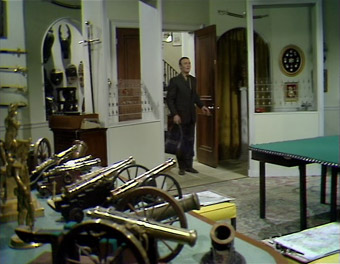
5. Amos Green Must Live (originally episode 9)
The body of Joseph Arillo, a black American fund raiser who was visiting Britain to meet with a Black Power group, is discovered by the police with a distinctive matchbook on his person, identical to one that's been sent to Amos Green (Corin Redgrave), a politician with openly anti-immigration views. With Cross assigned as the man's personal bodyguard, Callan is ordered to keep an eye on Green's housekeeper, May Coswood (Annette Crosbie, Victor Meldrew's long-suffering wife in One Foot in the Grave), who is secretly in love with troubled black militant Casey (Stefan Kalipha).
Although making for solid drama, it's the socio-political aspects that make this episode so fascinating, a time capsule of racial issues and attitudes in 1970 Britain, from the black radical movement to the racial prejudice suffered by those who ask only to be treated as equals. This is most directly expressed through the character of Casey, whose heartfelt rant about the mistreatment he suffers may frustrate Callan's urgent search for answers, but still prompts a surprisingly sympathetic response. The climax is as close as the series has so far come to large scale action, with a gas attack, a gunfight and a flaming car thrown into the mix.
6. God Help Your Friends (originally episode 7)
Ex-journalist and international businessman Mark Tedder (Michael Jayston) is planning to marry government interpreter Beth Lampton (Stephanie Beacham). Hunter, who suspects that Tedder is providing information to the other side, wants the marriage stopped. While Cross is installed at Beth's workplace as an 'efficiency expert', Callan employs an uncharacteristically well-dressed Lonely to break into Tedder's flat and search for something that will compromise the relationship.
The seedier side of Section business is highlighted here, with its most ruthless operative reduced to scraping for dirt and planting letters and photographs to destroy a relationship that he increasingly believes may be completely above board. A downbeat ending is on hand to remind us to keep our happy hats in the cupboard.
7. A Village Called 'G' (originally episode 4)
When Hunter's hyper-punctual secretary Liz (Lisa Langdon) fails to show up for work, the Section is put on red alert. A quiet word with Section armourer Judd (Harry Towb, sporting a slightly overdone American accent) reveals that Liz has been learning to shoot and that one of the Section's guns is missing. The pieces start falling in place with the news that Liz was the sole survivor of a wartime massacre that a visiting psychiatrist named Sabovski is suspected of having taken part in it. Callan is engaged to find and return her, "in one piece if possible," but is fully aware that he may have to take more extreme measures.
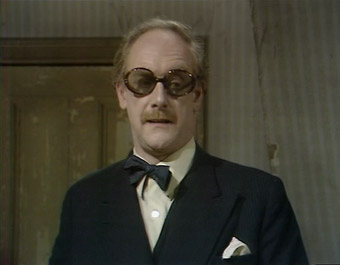
A taut and well plotted espionage thriller in which a confrontation with Cross prompts Callan to unexpectedly reign in his hostility, calling him by his first name and treating him more like a partner than a rival. Callan plays private detective to question a voyeuristic caretaker, and when a key character is injured he calls on the services of a former doctor from his prison days known as The Groper, an enjoyably flamboyant turn by the delightful Graham Crowden. Any question about whether Callan is tougher than Cross is firmly settled here.
8. Suddenly – At Home (originally episode 5)
When celebrated TV producer Rene Joinville (Tony Beckley) approaches Lady Janet Lewis (Zena Walker) about making a film about her late husband, a former foreign secretary, Hunter orders Callan to put a stop to the project, concerned at the secrets she may inadvertently reveal. Callan pays Lady Janet a visit and outlines the pressure that will be brought to bear on her should she fail to cooperate. She accepts the situation with unexpected good grace, and in the ensuing conversation a bond develops between her and Callan that shows all the signs of evolving into a full-blown romantic relationship. So imagine Callan's reaction when Lady Janet is killed and Cross is pegged as the chief suspect...
A rare short spell of contentment for Callan is cruelly undercut, putting him at potentially lethal odds with a man he already holds in contempt (that softening in episode 4 certainly didn't last long). The developing romance is really well handled (the performances completely sell it) and Hunter's businesslike approach is coolly captured when he prepares to meet Cross for the first time since the shooting and says to Callan, "You are armed, I take it." Callan's subsequent investigation of events, with Lonely's help of course, is savvy enough to impress even his cheerless boss. A climactic confrontation with Joinville suggests that Cross is not always as sharp as he needs to be.
9. Breakout (originally episode 8)
An enemy agent named Lubin (Garfield Morgan) hands himself in to the police to avoid being grabbed by the Section. Knowing that the KGB will arrange an escape and spirit him out of their reach, Callan is ordered to break into the jail in their place and deal with him before he can pass on the information he has accumulated on Section agents. With Lonely back inside to serve the final six months of his previous sentence (his confusion over the concept of concurrently run sentences is genuinely funny), Callan arranges for him to share a cell with Lubin and pass on the details of the breakout, then teams up with fellow agents Cross and Mellor (Billy Cornelius) to train for the operation.
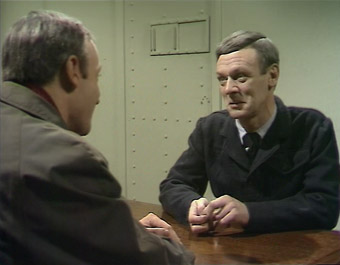
Originally shown as the penultimate episode of series 3, this compelling story was clearly intended as the season closer and has an ending that points to the direction the programme would take two years later in series 4. The training and breakout are nicely handled, and in keeping with the ethos of the series, the enemy agent is as smart and ruthless his Section equivalents. An episode highlight has Lonely passing a message to Lubin by singing it to the tune of a hymn in chapel, a trick borrowed directly from Hitchcock's The Man Who Knew Too Much.
1. That'll Be the Day
Series 4 opens with Callan's funeral – he's not actually dead, of course, but the only ones who know this are Hunter and Section boss Bishop (Geoffrey Chater), who've staged the whole thing to pre-empt any attempt by the KGB to make capital of Callan's capture on Russian soil. Although attended only by his colleagues, word gets to Lonely, who is bemused by the vicar's glowing eulogy and becomes convinced they've buried the wrong man, which makes him a target for potential Section action. Over in Moscow, meanwhile, repeated exposure to the truth drug Scopolamine is having its effect on Callan, crumbling his composure and threatening his long-term sanity.
An intriguingly plotted episode in which Cross treats Lonely to a game of Russian roulette, Woodward gets to show his acting metal (again), and Callan's true worth is called into question when the proposed exchange of agents to return him to British soil is considered a poor deal by just about everyone, Hunter included.
2. Call Me Sir!
Back on home turf after his ordeal, Callan expresses a keen desire to pack in his job, or at least to be removed from the field. The response from his superiors is unexpected – they offer him a position as the new Hunter, making it clear that, given what he may or may not have told the Russians during his captivity, it would be in his best interests to accept. He does, reluctantly, and his predecessor leaves "without a particle of regret" to move on to better things. Lonely, meanwhile, is having his portrait painted by an attractive woman named Flo Mayhew (Sarah Lawson), unaware that he has been targeted for termination, something Callan in his new position is determined to prevent.
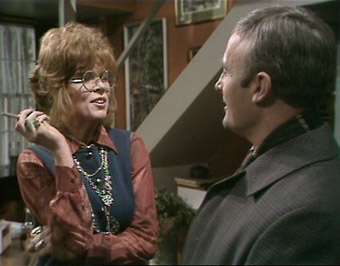
Taking Callan out of the field and putting him behind a desk is a risky move, as this promotes Cross to position of chief field operative, and engaging though he may be, he's no David Callan. The strengths and frailties of the bonds of friendship are repeatedly explored here, in the risks Callan takes to keep Lonely from harm, in the willingness of Section secretary Liz to pass herself off as Callan's lover to protect him from the vindictive Cross, and in the patriotic Lonely's hostility to Callan when he learns he's been working in Russia. The sight of Lonely posing for a portrait in Flo Mayhew's elegantly decorated parlor is one of the series' more bizarre images, and the ending, as so often, has a bitter sting in its tail.
3. First Refusal
A man named Kitzlinger has contacted the security services as go-between for someone with a list of all British agents currently active in Eastern Europe, which he is offering for sale before taking it to the other side. After losing Cross on the underground, he is contacted by a representative of Eastern Bloc interests, who is actually a Section agent with a very familiar face.
There's no doubt about it, Callan is a lot less interesting when stuck behind a desk, so my heart leapt just a bit at the return of Toby Meres, brought back from Washington by Callan on the strength of his skill as an operative. Their previous fateful meeting is inevitably brought up, and hopes that Callan will soon be forced back into the field are raised when Bishop tells him at the episode end, "You know, you really are a very bad Hunter." Callan also argues with Bishop for a "mobile communications facility," which is basically a taxi cab with radio communication to be driven by none other than Lonely. That it gets approved is probably the biggest credibility stretch in the series, given the highly secret nature of the Section's work.
4. Rules of the Game
Bishop informs Callan that Moscow is about to expel one of their junior cultural attachés, and that the Section is required to respond by leaning on his Russian equivalent, Adam Medov (Mike Pratt), until he is withdrawn from London. Callan gives the job to Cross, who begins a campaign of harassment and threats – a bullet through the window of his parked car, phone calls to his home claiming he is a spy – that upset his wife and teenage daughter and appear to bemuse Medov, but also prompt questions from Medov's superiors about just why he has been targeted.
The grubby side of counter-espionage becomes the focus of an involving episode, whose final act meeting between Callan and camp British spy Neville Dennis (a superb James Cossins) proves to be a season highlight, a brilliantly written and performed two-hander that climaxes with the return of the forceful and intimidating Callan of old. Further indication that Callan will be out from behind that desk in the near future comes when he explains to Bishop just why he was considered so good in the field, another fine bit of character writing by Ray Jenkins: "I was trained never to take anything or anyone on trust. You start off with one simple premise: everything smells. Yourself, the job you're doing and the man who tells you to do it. You're told something, you test the opposite." Brief light relief is provided by Lonely's dislike of Cross, whom he refers to as 'old poncy bags', and his cockney cabbie outrage at the car he blocks in to allow Cross and Medov to escape. Another dark ending – just how dark only becomes clear in the following episode.
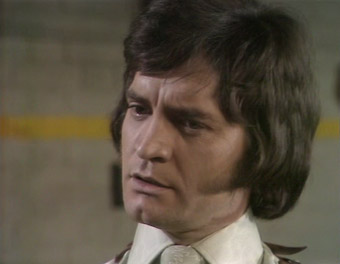
5. If He Can, So Could I
As a result of an incident in the previous episode that I'm not about to reveal here, Cross is subjected to a number of tests by creepy departmental shrink Snell – the results are inconclusive, but Snell is convinced there are problems that need investigating. Meres, meanwhile, is given the job of keeping an eye on tractor salesman Vadim (Morris Perry), whom Bishop suspects may actually be a professional killer named Burov, brought in to assassinate Russian defector and poet Trofimchuk (Peter Blythe). Callan dismisses Snell's findings and requests that Cross be returned to active duty, and assigns him the job of keeping a twenty-four hour watch on Trofimchuk at a Section safe house.
A turning-point episode in more than one respect, but in the spirit of spoiler avoidance, you'll have to watch it to find out why. The whole thing builds to red alert that sees Callan break Section protocol and do verbal battle with Bishop in a manner that effectively draws a line under his short spell as Hunter. In a rare loss of control, Callan later gets falling-down drunk and reflects on the darker side of his job to a genuinely concerned Lonely.
6. None of Your Business
With Meres charged with investigating university lecturer Paul West, who supplied high quality fake documents to an enemy agent found dead in an accident, Callan is officially relieved of duty as Hunter and put on what is euphemistically referred to as 'special leave'. Refused permission to leave the country, he uses Lonely to secure a fake passport from a dealer named Lucas (Tony Selby), which eventually leads him to the very people that Meres is investigating.
Two very familiar faces here in the support cast here in Tony Selby and Brian Murphy, and Lonely's terror of just about everyone sees him give up Callan's address to Lucas's goon, who breaks in and searches for information on this prospective new client's background. He makes the mistake of lifting one of Callan's model soldiers, which prompts its true owner to intimidate Lucas in that manner that always has me fidgeting with glee. Hunter #4 is back in charge and picks up as if he only stepped out of the room for a minute.
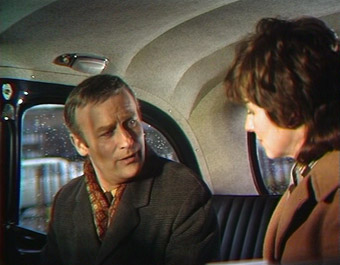
7. Charlie Says It's Goodbye
With things pretty much back to the Section norm, Callan is assigned to keep an eye on the well-to-do James Palliser (Dennis Price), whom Hunter suspects may be planning to defect. In the course of the operation he meets shop owner Susan Morris (Beth Harris), a woman with personal reasons to be hostile to members of the security service but whom Callan finds himself quickly attracted to.
Callan doesn't have much luck with women and Susan seems destined from the start to be no exception, particularly when a letter arrives on Hunter's desk informing him of the relationship. He orders Callan to stay away from her – Callan responds by telling Hunter to get stuffed. One of several episodes in season 4 that prompt Callan to seriously consider abandoning his career, but as he tells Susan, "When you're in as deep as I am, they don't let you go." We get to meet two very different enemy operatives in the shape of semi-hip minder Trent (Richard Morant) and the more experienced Komorowski (John G. Heller), whom Lonely describes to Callan as someone "I would not want to meet down a dark alley, if you was out working."
8. I Never Wanted the Job
Lonely is the only witness when a gang leader named Edward Dollar is gunned down on his doorstep by members of a rival firm. The police are searching for an unidentified cabbie, but Lonely's laying low, all too aware of the likely consequences of fingering the killers. He calls on Callan, who doesn't let a howling cold stop him from balling out Lonely for taking fares on the side, but takes a more personal interest when the killers take a hammer to the cab and turn up at his front door.
One of those episodes where our familiarity with Callan's modus operandi brings a special pleasure to scenes of confrontation, notably when he pays a visit to underworld kingpin Abbott (William Marlowe, another face many will recognise) and intimates threats that you know he is capable of carrying out. The problems of having Lonely for a friend are illustrated when the killers – one of whom is a perpetually cheerful soul named Sunshine (Michael Deacon) – are able to lean on him for Callan's address, though he does made partial amends with the ingenuity of his warning signal. The whole business rankles Hunter, who has other work for Callan and Meres that gets put aside while the pair deal with Abbott's inevitable retaliation. "I didn't tell you to take the law into your own hands like a couple of gangsters!" Hunter barks at Callan, who responds with, "Well, that's what we are, sir." An uncharacteristically amusing final scene sees Callan and Meres hauled before Hunter and fumbling excuses like caught-on-the-hop schoolboys, then exchanging friendly banter as they depart.
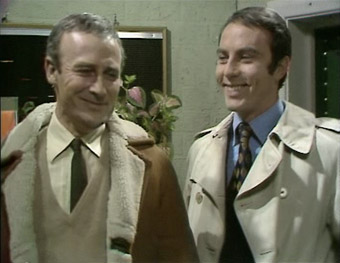
9. The Carrier
Callan and Lonely break in to a house to photograph documents contained within and then depart without leaving evidence of their entry. Unfortunately Lonely just can't resist taking something for himself and as soon as the rightful occupant – one Professor Rose (Peter Copely) – enters the room he knows he's had visitors. The reason for the break-in is that Rose is planning to pass on his research work to a man he has been misled to believe is a Dutch publisher, but who is actually enemy section leader Tamaresh (Ralph Nossek), a man prepared to kill anyone who gets in the way of him obtaining the documents.
A superb opening scene in which Callan and Lonely work wordlessly in perfect sync, their true purpose gradually revealed through the mechanics of their task, then suffers a serious credibility hiccup – it's not just that Callan would have intimidated Lonely into not lifting anything during such a crucial mission, but also that the object stolen is one that would obviously be missed by its owner. In no time at all the police are at Lonely's door, and when he gives them Callan's name as his alibi, both men are arrested. Their freedom is quickly secured by Hunter's police contact Chief Supt. Brown (Windsor Davies), but not before investigating officer Det. Insp. Vanstone (Michael Turner) has told Callan exactly what he thinks about the government hiring former criminals to do its dirty work.
10. The Contract
An attempt to trap ageing hit man Harcourt (Robert Urquhart) misfires, and Callan takes his place for a meeting with young radical Kristina (Jane Lapotaire), who has hired Harcourt to carry out a political assassination. The problem is that he'll be working with Etiene Lafarge, a French contract killer of some reputation who is instantly suspicious of his new colleague.
Callan goes undercover on a job he is duty-bound to prevent from being completed, but to do so means putting life on the line, giving us plenty to get nervous about in the second half. In the end it all comes down to chance and professionalism, and it's the latter that sells a potentially deux ex machina conclusion as plausible. Some lovely dialogue again, with Anthony Valentine's dry delivery making almost everything Meres says a small delight. In the course of staking out Harcourt, Callan gets to chat up his tarty neighbour Vera (Bernadette Milnes), and Lonely waxes lyrical on the attraction of local pubs and hot pies.
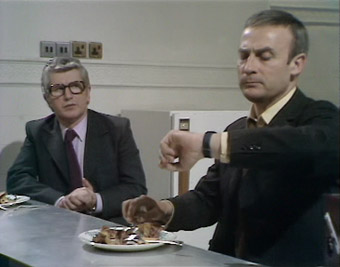
11. Call Me Enemy
Top enemy agent Richmond, first seen in the season opener That'll Be the Day, is being taken by Callan to an isolated safe house somewhere in the English countryside. Fed up with his life as a field agent and aware that his own side won't let him retire, Richmond is seeking asylum in the UK. Or is he? As Hunter and his team listen in, Callan and Richmond debate their lives and their profession, and in the course of their stay Richmond reveals that there may be a traitor within the Section.
It's a sign of just how well scripted, acted and directed this series is that it can make riveting drama out of what is essentially two people in a single location just talking about themselves. The verbal sparring that quickly evolves is impeccably handled, and the arrival of the person on whom suspicion has been cast only intensifies the tension.
Call Me Enemy is actually the first episode of a three-parter known originally (though not identified here) as The Richmond Files, which collectively bring series 4 and Callan itself to an end. This first act of the story has its own, surprising finale, but is not fully concluded until the end of episode 13. In an interesting reference to a word that the very same year was the title of a film about contract killers, Richmond tells Callan at one point, "You're a good mechanic Callan, very good at killing," while changing times are acknowledged by the introduction of communications expert Jarrow (Brian Croucher) an ex-army Captain whose casual dress and long hair leave Hunter wide-eyed with disbelief.
12. Do You Recognise the Woman?
Richmond makes contact with two field operatives, Dowsett (John Moore) and Norah (Sheila Fay), as part of his plan to spring one of their captured female operatives from jail (to reveal who would involve spoiling the end of a previous episode). An intercepted message alerts the Section of their plans, and the woman in question is placed under Callan's protection on the promise that she is to be exchanged for a British agent. As Meres closes in on the source of the messages, Callan and his charge get to know each other better, and her seemingly genuine plans for retirement reawaken Callan's own desire to leave the service.
As with the previous episode, much of what makes this one work lies not in the plot mechanics – good though they are – but the scenes in which Callan and his opposite number reflect on their lives and experiences, good natured discussions that are a league away from the verbal sparring with Richmond. "Has it occurred to you that we probably know more about each other than most married couples?" the woman asks of Callan at one point, as much a comment on their social isolation as the efficiency of Section and KGB investigators. Once again not everything is quite as it seems (the series is so good at this), and even if you guess how the episode will end, I'll wager you'll still get a couple of real surprises.
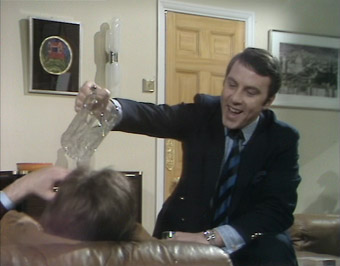
13. A Man Like Me
As the search for Richmond intensifies, Snell suggests using a computer to sort their gathered intelligence and identify locations and people that Richmond might be inclined to visit, prompting Callan to wearily suggest that humans are becoming redundant. Richmond, meanwhile, has moved in with Peter Harris, a one-time radical who appears to have forgotten his past pledge to provide help to enemy operatives should it ever be needed. While cheery computer operator Routledge (the always enjoyable Peter Sallis) processes the information, Callan has a Gregory House-like moment of inspiration and starts checking the purchase of Russian magazines on a hunch they've been used to pass a message to Richmond through the personal ads.
Solid plotting, great character scenes and a tense and downbeat warehouse climax make for a fine series closer. Meres once again gets some of the best dialogue, cheerfully passing himself off as Harris's old classmate, then subtly threatening him, a glass water pitcher in hand, with the suggestively delivered line, "When I was at school – my school, not your school – I was an absolute stinker. And I haven't changed a bit." Even Lonely has his moment of accidental heroism, and for the first and only time in the entire series Callan actually gets to replicate the iconic opening credits and shoot a light bulb. The episode ends in a conclusive manner, but also leaves the way open for more. Sadly, they never came.
Unlike its predecessors, series 3 and 4 of Callan were shot in colour on 625 line UHF video, with 16mm film once again used for exteriors. Given how iffy video material from this period can look, I was genuinely and very pleasantly surprised by the picture quality on Network's six-disc DVD set – the sharpness is good, the contrast well judged, and the colours, though often subject to an earthy hue, are at their best closer to natural than I would have expected for a programme of this vintage. There's little trace of serious tape damage, save for those small blips that video tape always seems to pick up over time, which though quite frequent at first become rarer as the series progresses. The film inserts do show, in part because of the increased grain, decreased sharpness and the appearance of dust spots, but they are a better match to the studio material than those on the early monochrome episodes. The only real glitches are studio ones – more than once I saw the shadow of a technician pass over the actors.
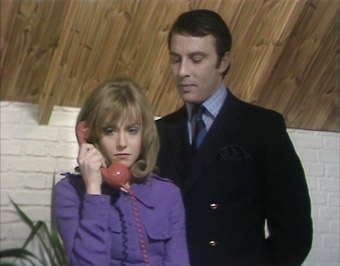
The Dolby 2.0 mono soundtrack really scores on clarity and stability – there's no hint of distortion or appreciable background fluff – and the dialogue recording is of a high standard throughout.
Once again, there are no extras, and once again, this is a shame. There's twenty-two episodes to enjoy, of course, almost twice as many as in the first box set, but at more than twice its price you'd expect just a little supplementary material.
I'll admit I'd have liked some extra features to provide the sort of insight into the making of the series that you'll find on Optimum's excellent Avengers box sets. But for the series itself and the quality of the transfers this release still has to come highly recommended, though you might just want to shop around a bit before buying.
|